We’re back from the Montreal International Game Summit (MIGS) 2024, held on October 30 and 31, where industry veterans, developers, and indie studios came together under a powerful theme: Resilience.
This year’s summit proved that, despite market challenges, the gaming community remains resilient and ready to ride the wave. Experts across panels and discussions highlighted the hurdles, victories, and groundbreaking innovations that continue to drive our industry forward.
In the panel Understanding Market Dynamics in 2024 to Ensure the Success of Your Game, industry leaders Jason Della Rocca, Matthew Handrahan, Chloe Giusti, and Clara Sia shared invaluable, practical advice for indie developers on preparing and delivering standout pitches — whether to publishers, investors, or even for self-publishing.
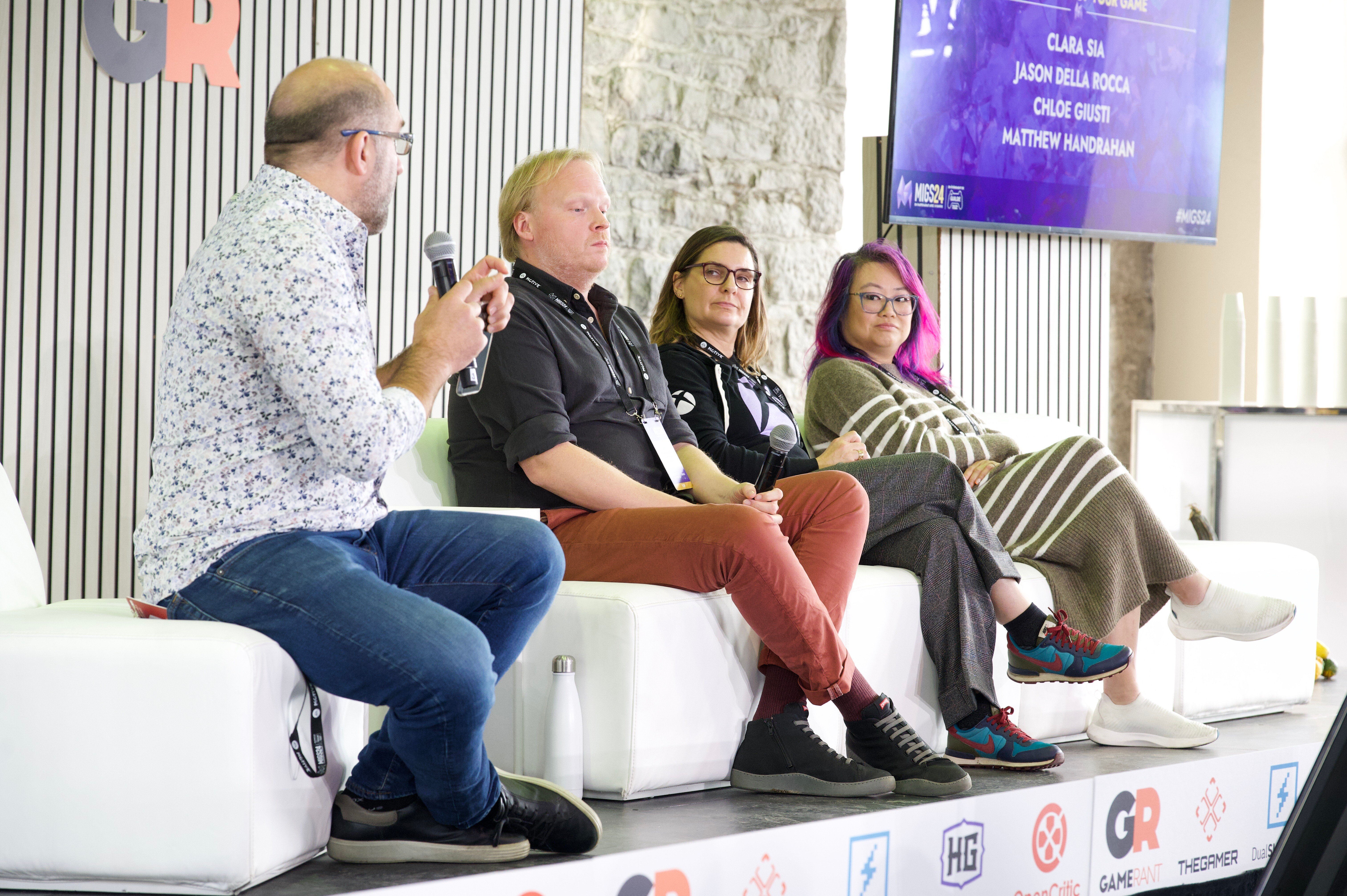 Experts (in order) Jason Della Rocca, Matthew Handrahan, Chloe Giusti, and Clara Sia presenting the panel “Understanding Market Dynamics in 2024 to Ensure the Success of Your Game” - Photo by Astrid Rousselin. All rights reserved to GameRebellion.
Experts (in order) Jason Della Rocca, Matthew Handrahan, Chloe Giusti, and Clara Sia presenting the panel “Understanding Market Dynamics in 2024 to Ensure the Success of Your Game” - Photo by Astrid Rousselin. All rights reserved to GameRebellion.
Drawing from their insights, we’ve crafted a quick guide to help indie studios confidently navigate the road to pitching success!
Understanding Today’s Market Realities
According to the panelists, the gaming industry is facing what some call a new “indie apocalypse.” The sheer volume of games released each year has led to a crowded market where gaining visibility is increasingly difficult, and a dwindling number of publishers makes it even harder for new and small studios to secure partnerships.
A survey conducted in late 2023, by game marketer Yannick Elahee aka Tavrox, revealed that 60.3% of developers believe there are too many games being released, making it difficult for individual titles to gain visibility.
Additionally, 69% of respondents indicated that securing funding for new projects has become more challenging, with only 12% confident in obtaining investment or publishing deals.

How’s Autumn 2023 for indie game dev studios? Published on Medium by Tavrox on Nov 24, 2023.
As Jason Della Rocca noted, “2025 is quite optimistic for the market to pick up. It’s probably going to take longer than that.” His sentiment echoes the survey findings, with 41.4% of respondents believing the global games industry will recover only in two years or more.
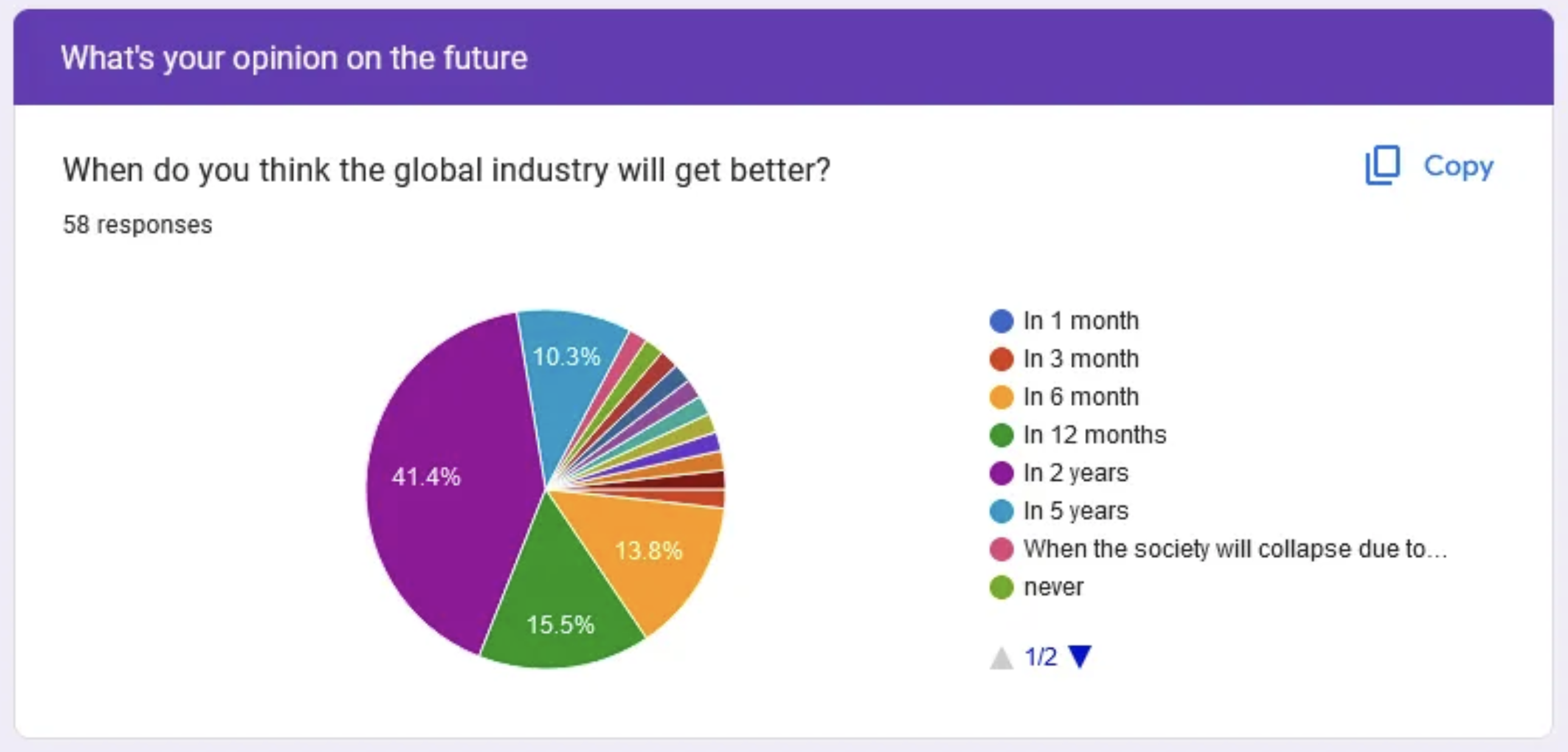
How’s Autumn 2023 for indie game dev studios? Published on Medium by Tavrox on Nov 24, 2023.
The panel urged indie developers to adapt to these new realities by setting realistic goals, recognizing that the AAA approach may not suit smaller teams, and exploring creative self-publishing paths when traditional routes aren’t accessible.
Key Tips for Securing Publisher and Investor Interest
When it comes to impressing potential investors or publishers, preparation is everything. The panelists emphasized that indie developers should have these key materials ready to make a strong first impression:
- Playable Build: Showcase a small, polished slice of your game. You don’t need to present a finished product — just a demo that lets potential partners experience the core mechanics without feeling overwhelmed.
- One-Pager: A high-level overview of your game that covers key features, target audience, platform, and a brief story synopsis. Keep it concise and impactful to leave a lasting impression.
- Pitch Deck: Create a well-structured presentation with gameplay screenshots, unique selling points, your studio’s vision, and a clear strategy for market positioning.
- Budget Breakdown: Be transparent. Provide a realistic budget covering development, marketing, and contingency funds. Avoid inflated numbers to keep expectations grounded.
- Early Access Strategy: If your game is in early access, be prepared to discuss its benefits and plans. Early access can validate your game with the market, but it needs to be a deliberate part of your project’s lifecycle.
- Follower Base: In today’s market, publishers often look for games with an established fanbase or crowdfunding support. Building a following early can significantly boost your appeal.
“Prepare all the stuff, then you’re ready to go!” urged Della Rocca. His advice underscores the industry’s shift towards self-sufficiency. Having these materials ready not only shows professionalism but also reassures potential partners that you’ve thoroughly planned every detail.
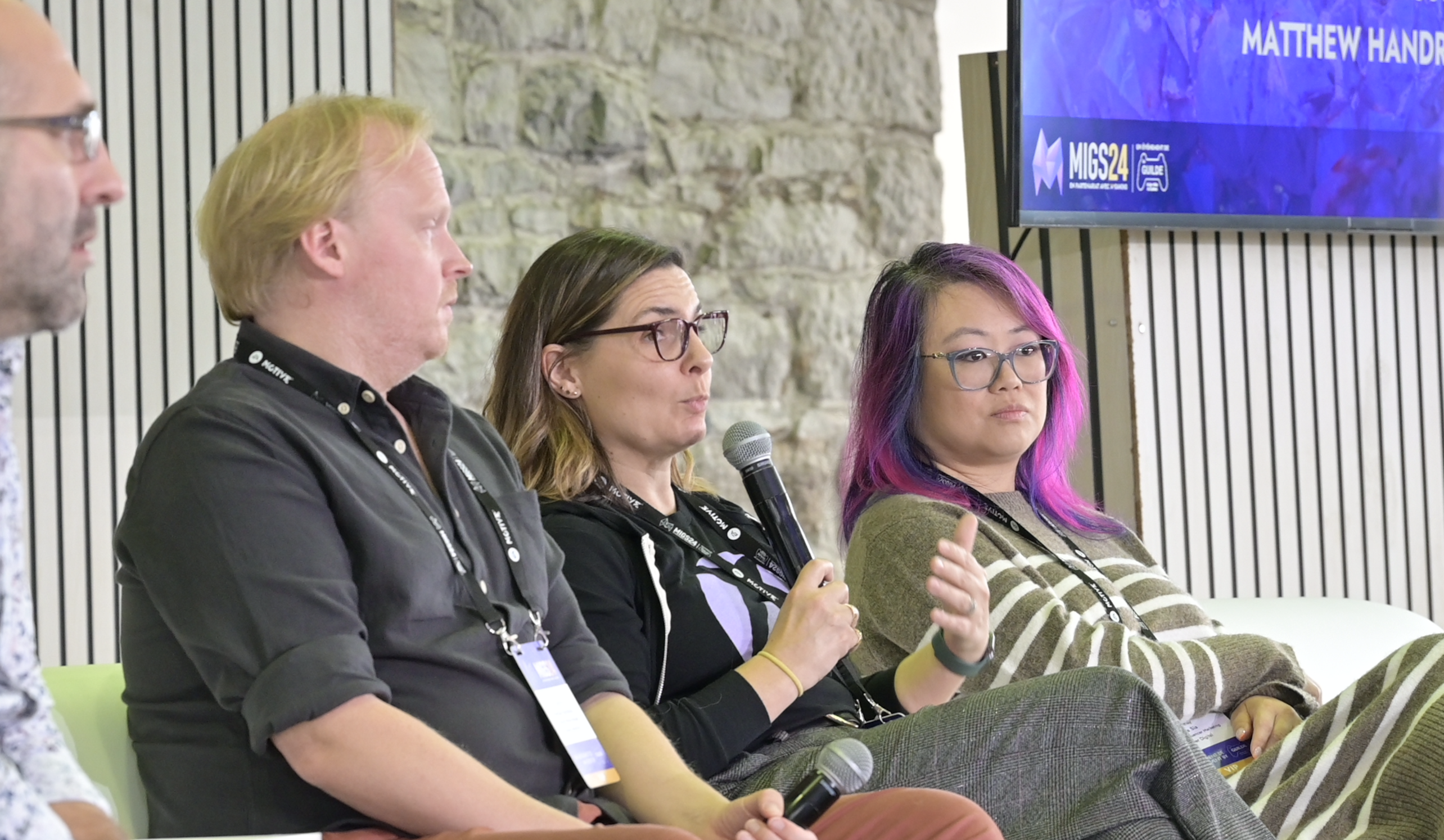 Experts Jason Della Rocca (left), Matthew Handrahan (center left), Chloe Giusti (center right), and Clara Sia (right) presenting the panel “Understanding Market Dynamics in 2024 to Ensure the Success of Your Game” - Photo by Astrid Rousselin. All rights reserved to GameRebellion.
Experts Jason Della Rocca (left), Matthew Handrahan (center left), Chloe Giusti (center right), and Clara Sia (right) presenting the panel “Understanding Market Dynamics in 2024 to Ensure the Success of Your Game” - Photo by Astrid Rousselin. All rights reserved to GameRebellion.
“Publishers are like cats,” joked Clara Sia. “If you chase after them, they’ll slip away. Act like you don’t need their attention, and they’ll come right to you. It’s counterintuitive, but it works.”
Pitching Mindset: Creating a Compelling Story Without Overpromising
When it comes to crafting a winning pitch, striking the right balance between ambition and realism is essential. Here are some key insights to keep in mind:
- Lead with goals, Not big numbers: “Set realistic expectations and avoid coming across as overambitious,” advised Matthew Handrahan. Publishers are often cautious of projections that sound too good to be true. Instead, focus on attainable milestones that show a grounded approach and a clear roadmap.
- Create a sense of completion: During the pandemic, developers found that games giving players a feeling of accomplishment resonated more strongly. Design with a sense of closure in mind, so players feel rewarded for their journey. This not only boosts satisfaction but can also drive organic word-of-mouth marketing.
- Self-Publishing as leverage: One surprising tip? Approach publishers with the mindset that you don’t need them to succeed. Coming in with an “I can do it on my own” attitude signals independence and self-sufficiency, which can make your game even more appealing. Publishers may be more inclined to partner with studios that exude confidence and resourcefulness.
This approach to pitching not only helps convey your vision but also reassures potential partners that you’re prepared to see your game through—no matter the path it takes.
Building a Market Presence from Day One
The panelists emphasized that marketing should be woven into the entire development journey, not just saved for the finish line. Building a community around your game from day one is essential, whether through Discord servers, social media, or regular developer updates.
Every message you put out there should have a purpose. As Clara Sia noted, “Everything you say publicly, say it with intention.”
Creating intentional updates and generating early excitement allows studios to draw in fans gradually, building momentum with every new announcement. When it’s time to reveal your game’s release, a single social media post won’t cut it. Instead, plan a multi-layered strategy with teasers, developer insights, gameplay sneak peeks, and a even launch trailer that together create a powerful buzz.
Learning from Indie Game Pitch Competitors
A standout highlight at MIGS each year is the Indie Game Pitch competition, where developers present their games to industry experts, putting the panel’s insights into action in real time.

MIGS 2024 Indie Game Competition - Photo taken by Astrid Rousselin, all rights to GameRebellion.
After weeks of preparation, competitors took the stage equipped with playable builds, market strategies, and, in some cases, a hint at self-publishing plans—all echoing the expert advice shared earlier in the day.
The competition served as a live showcase of effective pitching techniques, giving attendees a front-row view of how polished pitches can captivate and inspire.
Funding Options and Canadian Advantage
For indie developers, securing funding can be one of the toughest challenges. Fortunately, Canadian studios have a distinct advantage, with more funding options available than in the U.S., giving them a crucial edge in the competitive indie market.
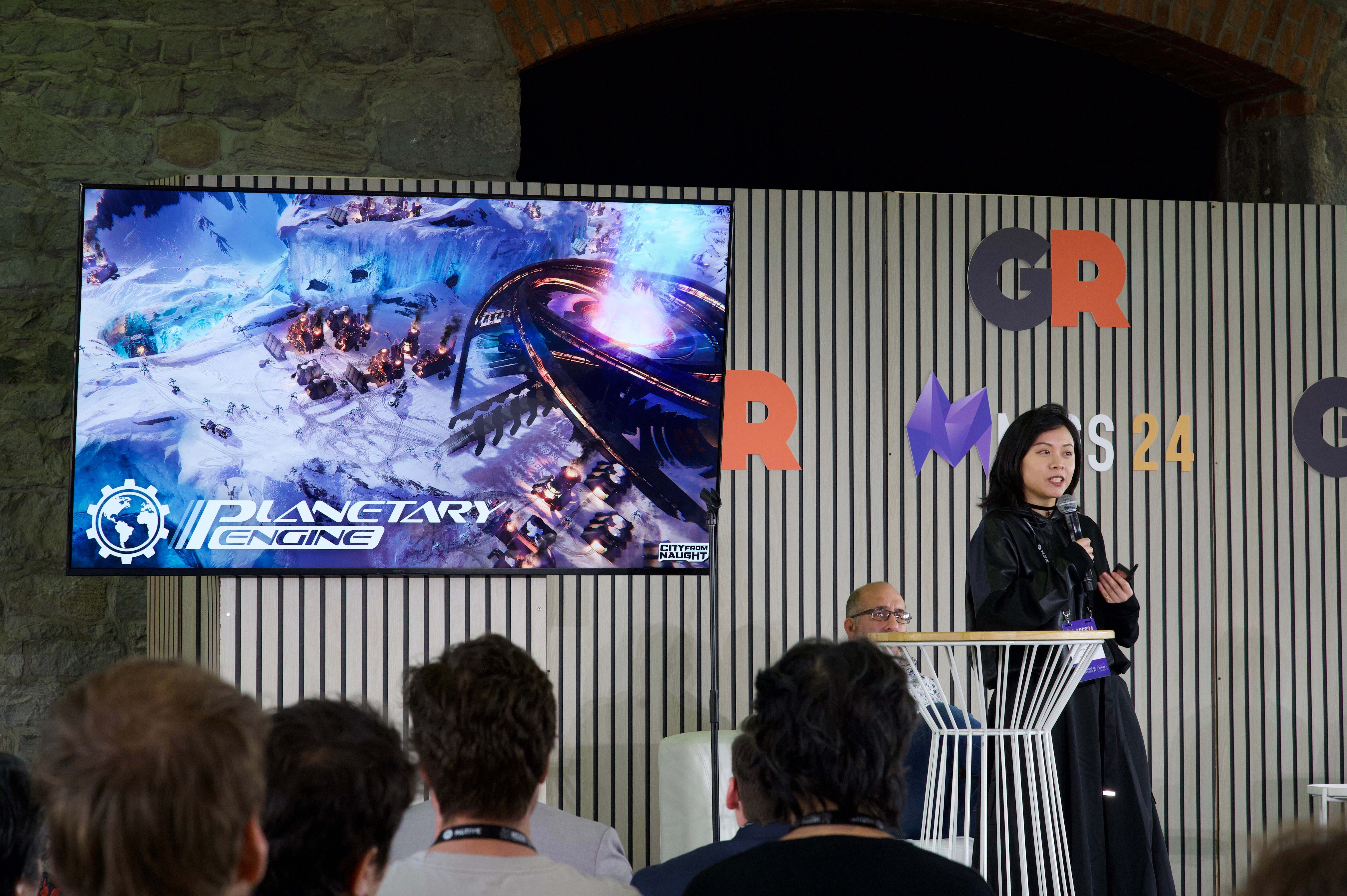 MIGS 2024 Indie Game Competition, Shala Chen is presenting her game Planetary Engine by studio City from Naught - Photo taken by Astrid Rousselin, all rights to GameRebellion.
MIGS 2024 Indie Game Competition, Shala Chen is presenting her game Planetary Engine by studio City from Naught - Photo taken by Astrid Rousselin, all rights to GameRebellion.
The panellists highlighted several Canadian programs that provide invaluable support for indie studios, such as:
- Canada Media Fund (CMF): One of the most significant sources of support, the CMF offers various programs to help fund innovative digital content. Through its Experimental Stream, indie developers can apply for funding to support the creation and commercialization of original, interactive media projects. They even had a booth at MIGS to showcase their program to indie studios seeking funds.
- Ontario Creates: For studios based in Ontario, they offers a range of grants tailored to support different stages of game development. Their Interactive Digital Media Fund assists with production and marketing costs, making it easier for developers to bring unique projects to market.
- Québec Tax Credits: For studios based in Québec, the province offers attractive tax credits on production expenses. These credits can significantly reduce development costs, making it an appealing base for indie studios looking to optimize their budgets.
Panellists shared success stories like Pacific Drive, Expedition 33 (we cannot wait for the release), and Eternal Strands, a Canadian game that found success through self-publishing, partly fueled by these types of resources.
Embracing the Long Road: Building Trust and Experience
One of the most resonant takeaways from MIGS was the importance of persistence. “The more games you’ll (self) publish, the more experience and trust you’ll build around your brand,” noted Matthew Handrahan.
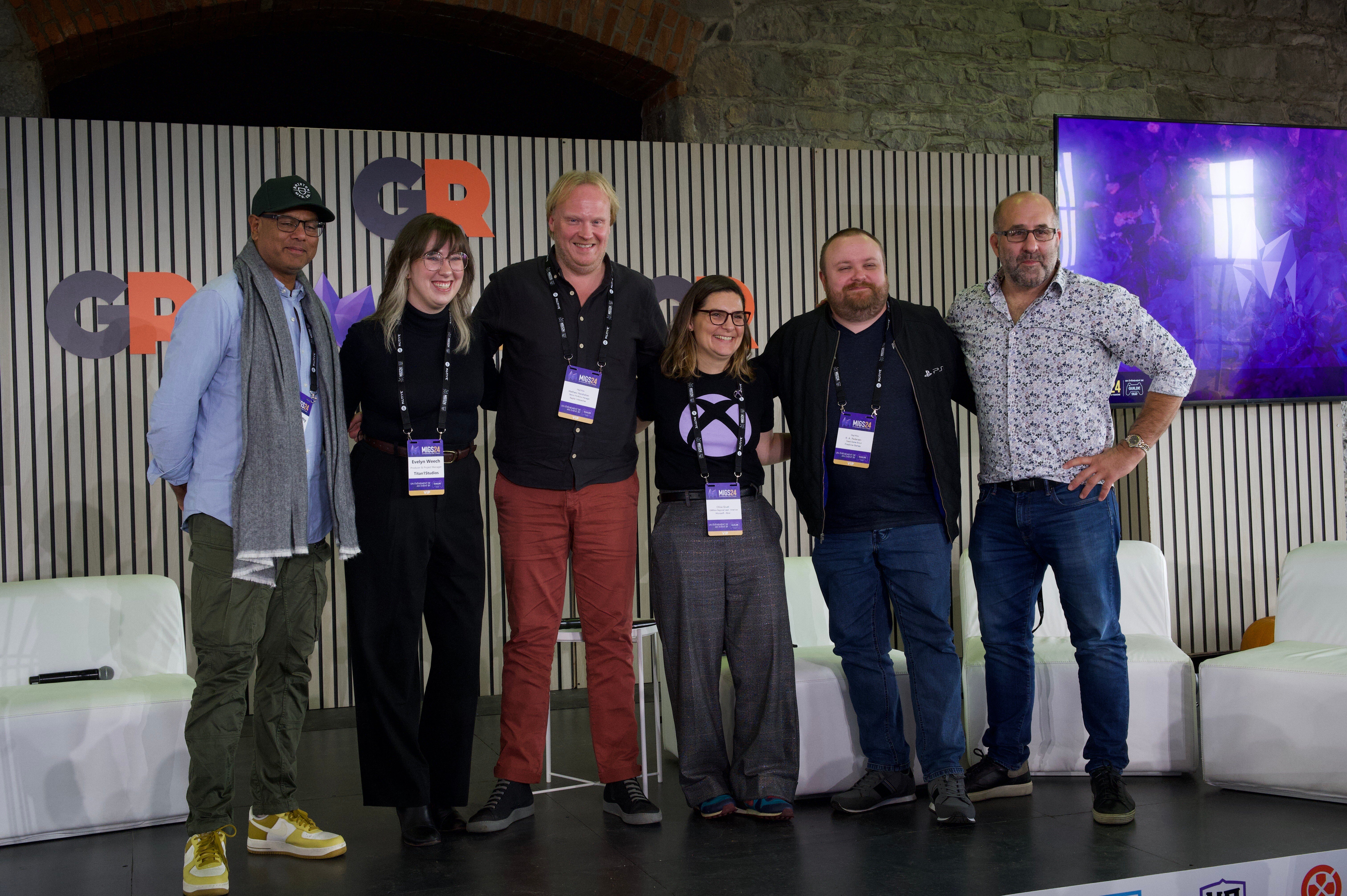
Judge panels for the Indie pitch competition, including Jason Della Rocca (far right), K.A. Pederson (right) Chloe Giusti (center right), Matthew Handrahan (center left), and the pitch competition winner Evelyn Weech for Love is a roguelite from Titan1studios - Photo taken by Astrid Rousselin, all rights to GameRebellion.
In an industry where success often requires both talent and resilience, each game released —even those that fall short commercially — adds valuable experience to your portfolio. Building a reputation takes time, and each project, big or small, helps to strengthen your credibility and relationships within the industry.
Panelists encouraged developers to view every release as a stepping stone, not just toward immediate success but also toward long-term recognition. Every game offers a chance to refine skills, learn from audience feedback, and develop a more nuanced understanding of market trends.
This accumulation of experience doesn’t just benefit future projects; it establishes a track record that can open doors to new partnerships and support.
Embracing this long-term mindset is about more than just persistence; it’s about building a brand that partners, players, and the industry can trust.
Resilience in a Changing Landscape
MIGS 2024 reminded us that survival in today’s gaming market requires resilience, creativity, on top of strategic preparation. Whether you’re aiming for a publisher’s backing or choosing the self-publishing route, building a following early, preparing thoroughly for every pitch, and approaching the journey with intention are essential steps to survive in this industry.
As you work toward these goals, a solid market analysis can make all the difference. Our game market analysis helps indie studios clarify their market positioning, understand their competition, and refine their pitch.
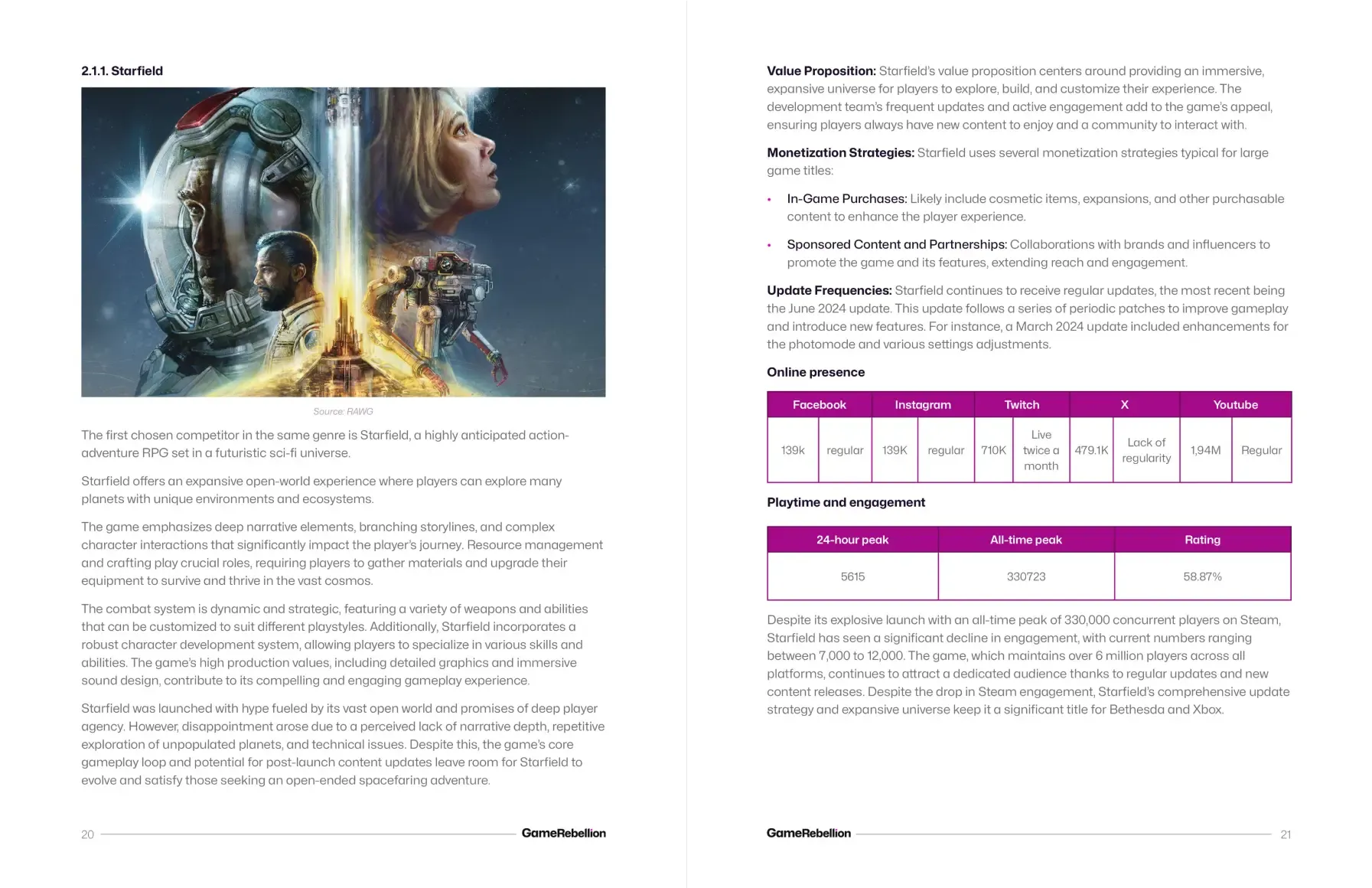
Game Rebellion’s Game Market Analysis, Market overview mock-up.
This groundwork not only strengthens your approach for funding applications but also demonstrates to investors the strategic planning behind your project. By leveraging our insights, you can present a compelling pitch for your game, backed by data and a clear understanding of your market.
Take the next step to empower your journey—discover how our market analysis can support your project and bring your vision closer to reality.









